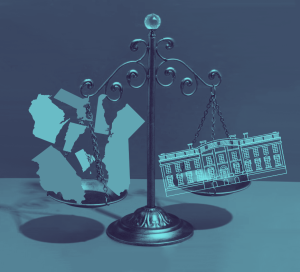
Published: August 8, 2025
Updated: October 23, 2025
States have many tools to help counter federal abuses of power. Facing a torrent of controversial federal government actions, states today are pursuing or considering an array of options. In a series of ongoing projects, we are examining potential state-level checks on federal overreach that have thus far received limited academic and public attention. These studies aim to provide in-depth legal background and context for anyone interested in learning more about how our federalist system creates space for and seeks to manage confrontations between states and the federal government.
Explainer: Can States Prosecute Federal Officials? 
What recourse do states have when federal employees engage in on-the-job conduct that violates state criminal laws? This Explainer explores that question. For more than two centuries, state and local prosecutors have pursued criminal charges against federal actors in a wide variety of contexts, including at moments of significant tension between states and the federal government. Legally, the doctrine of Supremacy Clause immunity gives federal actors some protection against such prosecutions, but it does not wholly insulate them from state criminal liability. While the doctrine’s contours are somewhat amorphous, the core inquiry is whether the federal employee reasonably acted within the bounds of their lawful federal duties. If so, the state criminal charges likely cannot move forward. But if the federal actor’s conduct was unreasonable, beyond the scope of their official duties, or contrary to federal law, the state prosecution can often proceed.
After recounting past examples of state prosecutions of federal officials, from the early nineteenth century to recent years, the Explainer analyzes how the Supreme Court and lower federal courts have articulated and applied the test for Supremacy Clause immunity. The Explainer also discusses the jurisdictional rules that often enable federal officials to shift state prosecutions into federal court. The Explainer concludes by identifying several categories of state criminal laws that may be especially relevant to the conduct of federal officials.
Explainer: State-Created Damages Remedies Against Federal Officials 
Victims of unconstitutional federal actions often have difficulty recovering money damages for their injuries. This Explainer discusses a potential remedial pathway that is beginning to garner interest among policymakers and litigants: state-created causes of action authorizing people to sue federal officials for damages. This is an idea that Professor Akhil Amar introduced to the academic literature decades ago, dubbing it “converse 1983.” Under a landmark federal statute, 42 U.S.C. § 1983, individuals can seek damages from state or local officials who violate constitutional rights. State converse 1983 laws, in contrast, allow individuals to reach wrongdoing by federal officials.
This Explainer identifies several states that already have laws that appear to allow for converse 1983 lawsuits. It discusses how such lawsuits might unfold and assesses the arguments that federal actors would likely offer in opposition. These include arguments that federal statutory law preempts converse 1983 actions, that the U.S. Constitution’s Supremacy Clause forecloses converse 1983 actions, and that, at a minimum, federal officials should receive qualified immunity. Although it is difficult to predict exactly how federal courts might resolve such arguments, the Explainer concludes that states can offer strong responses to each likely objection. Converse 1983 actions may therefore offer a viable way to close existing remedial gaps and to deliver a measure of justice and accountability for victims of unconstitutional federal actions.
- On October 22, 2025, SDRI’s faculty co-directors submitted an amicus brief with other legal scholars in Quiñonez v. United States, a Ninth Circuit case in which the plaintiffs seek to pursue converse-1983 claims through California’s Tom Bane Civil Rights Act.
Explainer: Can States Prohibit Federal Law Enforcement from Masking on the Job?
As the federal government ramps up immigration enforcement under President Trump’s second administration, federal agents sometimes conduct operations while wearing masks or other face coverings that disguise their identities. A growing number of states and localities have responded by considering and beginning to adopt their own laws to restrict masking by law enforcement. These efforts have prompted questions and commentary regarding states’ power to regulate federal actors. In particular, can state and local mask bans bind federal law enforcement without running afoul of the U.S. Constitution’s Supremacy Clause?
This Explainer describes the recently enacted mask ban in California and the proposed laws in other states. It then analyzes the constitutionality of these state efforts. Under existing precedent, mask bans are neither clearly prohibited nor clearly permissible. While opponents can plausibly analogize mask bans to other state and local policies that courts have held cannot apply to federal actors, proponents can reasonably distinguish those precedents and analogize to cases upholding application of state and local policies to federal actors. This Explainer also provides an overview of other options states may have to address masking by federal law enforcement.
SDRI Project Contacts:
Harrison Stark, Senior Counsel & Director of Special Projects
Bryna Godar, Staff Attorney
Bridget Lavender, Staff Attorney